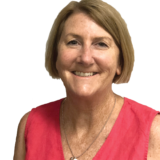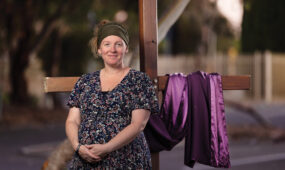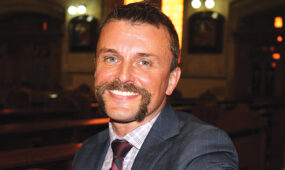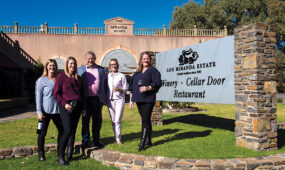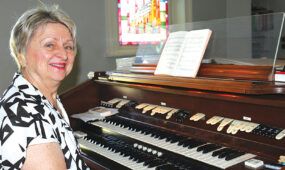Sally fulfilling childhood dream
People
Sr Sally Duigan OLSH, director of the Holy Family Care Centre in Limpopo, South Africa, was back in her home city of Adelaide visiting family and friends late last year. She spoke to JENNY BRINKWORTH about her work with orphans and vulnerable children in the Diocese of Tzaneen.
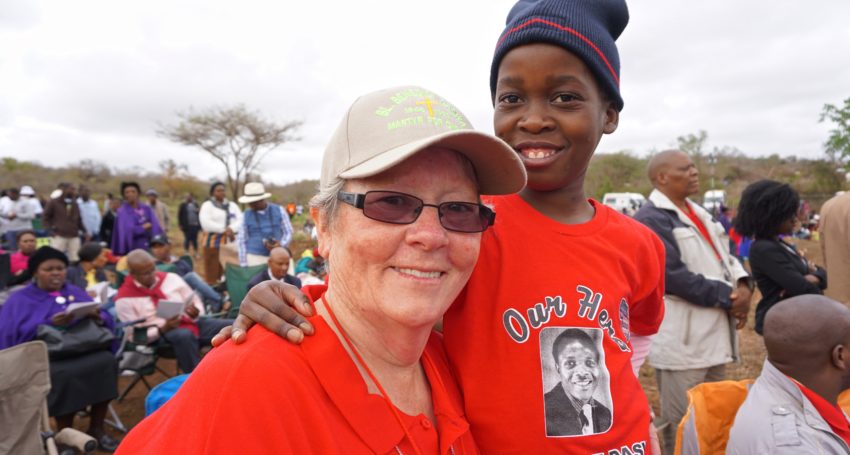
At the height of the HIV/AIDS pandemic in Africa, there were times when Sr Sally Duigan’s faith was put to the test as she witnessed the devastating impact on families.
Even now when there is treatment available, it’s not necessarily accessible in places like Limpopo, the northern most province of South Africa.
When Sally receives a phone call from police asking her to take in another baby abandoned by their mother, or she must tell a distraught child that their mother is dead, it takes all her strength to “not cross the line”.
Advertisement
But in these dark moments she has been able to draw on the “deep spiritual heritage” in which she was trained and formed as a Daughter of Our Lady of the Sacred Heart (OLSH).
“It’s really about compassion, love, empathy and kindness, they’re the aspects of heart spirituality that really speak to me,” Sally said.
“I try to live them every day and our spirituality nourishes me and enables me to continue doing what I do.”
After 33 years in South Africa, the 71 year old is grateful for the opportunity to pursue her vocation in this part of the world.
“I feel like I am just living our charism, that’s what I was called to do, and it’s easy to do in this setting,” she said. “You can feel it, you can touch it, you can see it. There’s no place that I’ve ever been where I feel it more than I do now because I’m with the most vulnerable children you can imagine.”
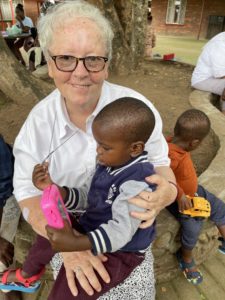 While the Centre receives a subsidy from the Department of Social Development it relies heavily on donations to cover the shortfall and to provide quality care for the children. Much of the funding for the work of the Daughters in Limpopo comes from the OLSH Overseas Aid Fund but they have also received thousands of dollars from the proceeds of the Romero Community’s annual musicals, produced by Sr Janet Mead RSM until her death in January last year. Even when performances were cancelled during COVID and following Sr Janet’s death, tickets were still purchased and the money donated to the Centre.
While the Centre receives a subsidy from the Department of Social Development it relies heavily on donations to cover the shortfall and to provide quality care for the children. Much of the funding for the work of the Daughters in Limpopo comes from the OLSH Overseas Aid Fund but they have also received thousands of dollars from the proceeds of the Romero Community’s annual musicals, produced by Sr Janet Mead RSM until her death in January last year. Even when performances were cancelled during COVID and following Sr Janet’s death, tickets were still purchased and the money donated to the Centre.
Sally’s friendship with Sr Janet dates back to her years as a student in Mount Gambier, where she was taught by Sr Janet and performed in her musicals.
One of 10 children and a sister to Mary-Anne Duigan RSM, Sally said from the time she was a young child she wanted to be a missionary.
“There was a picture in our home of the Sacred Heart of Jesus… I often gazed at that as a child, not that I was a holy little girl, I was very naughty,” she laughed, adding that she was also inspired by Mercy Sisters working in Papua New Guinea who visited her school.
It was a chance meeting with an OLSH midwife at Calvary Hospital, and her tales of working in a leprosarium outside of Darwin, that led Sally to join this congregation. Her Aunt Sally (Sr M Paschal) was also an OLSH Sister.
After joining the Daughters, she studied community welfare at Darwin Community College and lived on Bathurst Island, in Alice Springs and in Darwin. Her studies in sociology and anthropology focused on Tiwi culture, but after graduating she was posted to the Philippines for four years.
Advertisement
Sally was asked to come back to work in vocation and mission promotion and during that year the Bishop of Tzaneen invited the congregation to send Sisters to work at St Brendan’s School in Limpopo. Sally was immediately interested but first she had to complete her teaching degree, which included three years studying at Strathfield, Sydney, and a final year at the University of South Australia.
After a few years as a teacher at St Brendan’s she was made principal and after 11 years, while on a break in 2000, the Bishop asked her to head up the HIV/AIDS response in the Tzaneen diocese.
“That took me on a whole different direction,” she said.
“We set up centres in all the parishes in the diocese, there were 14 centres – we focused on three main programs: Education for Life, Home-based Care, and Orphans and Vulnerable Children.
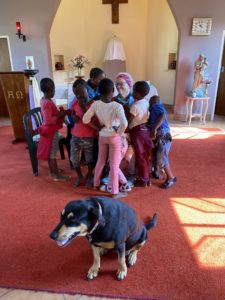
Sr Sally with children from the centre and Zoe the dog.
“It was really huge and the things I saw and the things I experienced were just heartbreaking.”
In recent years the diocese has handed the frontline work back to the South African Government, but HIV/AIDS continues to affect the community.
“Sadly, about a third of our children are being treated for HIV/AIDS; there are still children being born with HIV even though there is treatment to prevent it,” she said.
“Most are so poor and at times the medication doesn’t reach the clinics.”
During COVID Sally introduced home schooling for the 55 school children resident at the Centre who normally attend school in the local village. Here she was able to put her education skills into practice. The residential facility has 76 children and young people aged from
1 day old to 18 years.
“A lot of mothers have very serious mental health issues and try to kill their babies, others are left abandoned in the bush or a tavern somewhere,” Sally said.
“I always feel a lot of empathy for the mothers who abandon their children because I don’t think they do it because they want to, but because they are often the victims of domestic violence and they do it for safety for themselves and for the child.
“For as many children as there are, there are many different stories…the shocking things children have witnessed and been exposed to, you can’t even repeat them.”
Another major problem is the use of witchcraft and the fear this causes. Sally was involved in the beatification of Benedict Daswa, a South African school teacher and principal who converted to Catholicism and was murdered by a local mob after he refused to pay support for anti-Christian superstition.
As Chancellor in the diocese, Sally was asked by Bishop Slattery to help with the cause for his martyrdom. She also had a personal connection through Benedict’s children who attended St Brendan’s School.
“There’s still witchcraft abounding and people practising traditions,” Sally said, adding only two per cent of the population in the diocese were Catholic.
On the positive side, she said it was very rewarding to see the children at the Centre develop and grow up.
“It becomes their home and the children love to come back to visit and to keep in touch through text messages and phone calls,” she added.
“I’m privileged in a sense that I get to live the dream I had as a child.”


